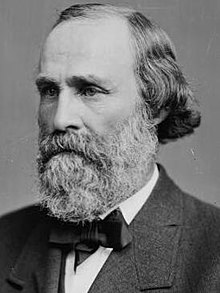Henry Laurens Dawes | |
|---|---|
 | |
| United States Senator from Massachusetts | |
| In office March 4, 1875 – March 3, 1893 | |
| Preceded by | William B. Washburn |
| Succeeded by | Henry Cabot Lodge |
| Member of the U.S. House of Representatives from Massachusetts | |
| In office March 4, 1857 – March 4, 1875 | |
| Preceded by | Mark Trafton |
| Succeeded by | Chester W. Chapin |
| Constituency | 11th district (1857–1863) 10th district (1863–1873) 11th district (1873–1875) |
| Member of the Massachusetts Senate from the Berkshire district | |
| In office 1850 | |
| Preceded by | John Z. Goodrich William A. Phelps |
| Succeeded by | Richard P. Brown Asa G. Welch |
| Member of the Massachusetts House of Representatives | |
| In office 1848–1849 1852 | |
| Personal details | |
| Born | October 30, 1816 Cummington, Massachusetts, US |
| Died | February 5, 1903 (aged 86) Pittsfield, Massachusetts, US |
| Political party | Republican |
| Children | 5 |
| Alma mater | Yale University |
| Profession | Lawyer and Doctor |
| Signature |  |
Henry Laurens Dawes (October 30, 1816 – February 5, 1903) was an attorney and politician, a Republican United States Senator and United States Representative from Massachusetts. He is notable for the Dawes Act (1887), which was intended to stimulate the assimilation of Native Americans by ending the tribal government and control of communal lands. Especially directed at the tribes in Indian Territory, it provided for the allotment of tribal lands to individual households of tribal members, and for their being granted United States citizenship. This also made them subject to state and federal taxes. In addition, extinguishing tribal land claims in this territory later enabled the admission of Oklahoma as a state in 1907.